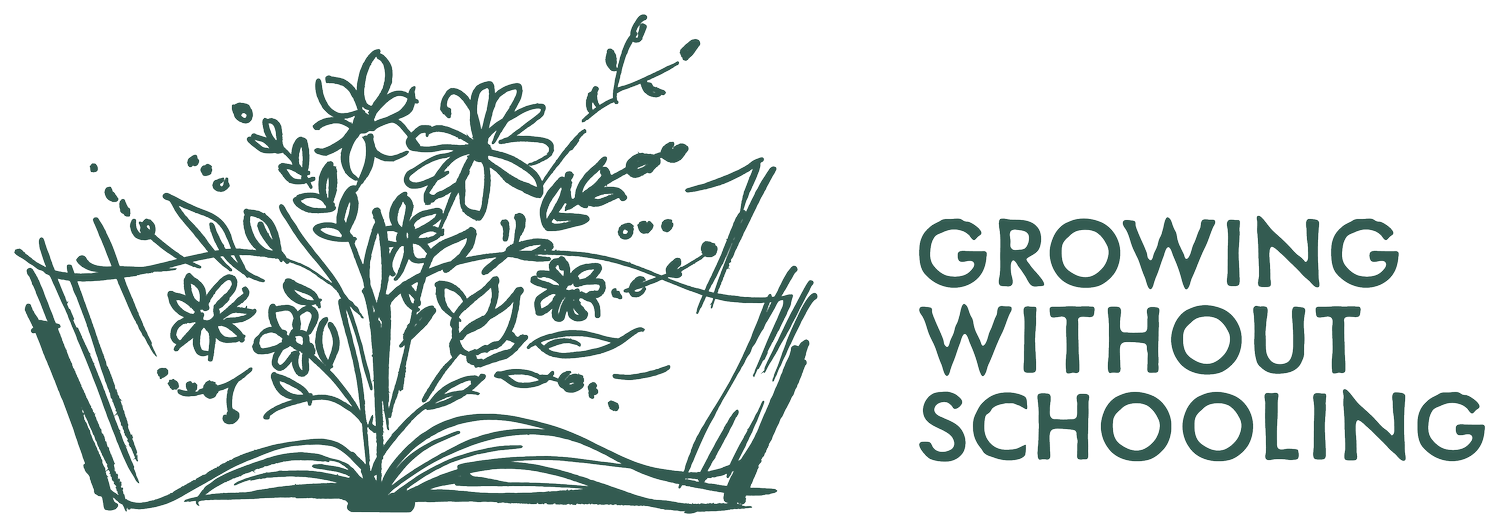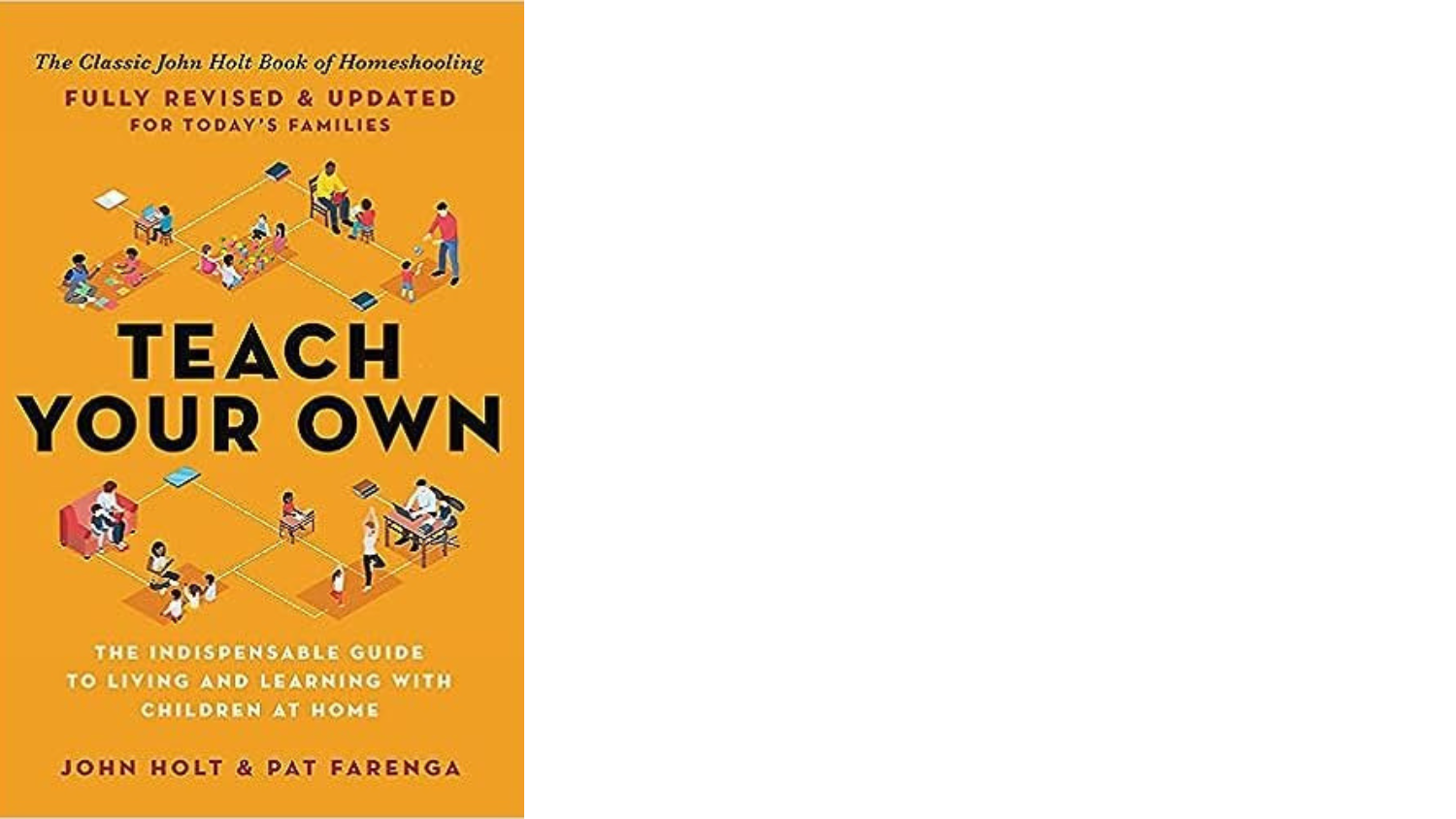
Books by John Holt
Teach Your Own
2021 third edition revised by Pat Farenga (original edition, 1981; second edition, 2003).
In 2019, there were more than two million children being homeschooled. That number doubled during the pandemic and is now likely to continue increasing as more parents worry that school might not be the best place for their children to learn and grow.
Teach Your Own helped launch the homeschooling movement; now, its timeless and revolutionary message of recognizing the ways children come to understand the world has been updated for today’s environment.
Learning All the Time
1989.
From the book:
“When I talk with parents abut the dangers of unwanted help, they will often ask how to tell the difference between being responsive and being intrusive. I usually suggest that they let their children tell them the difference. Since the children won't do it with words, probably, this means being alert to their signals.
The most difficult challenge is not to have hurt feelings when they send a ‘leave me alone, let me do it’ signal. If children send such a signal, parents needn't apologize or make a big thing of it; they can just say, ‘Sure,’ and go on about their business.”
How Children Learn
Revised Edition, 1983 (original edition 1967).
Teacher, school reformer, and author Deborah Meier writes about John’s influence on her: "Putting John’s ideas into practice absorbed the next half century of my life. I always returned to his work to remind me of what we all shared: the fears that make learning harder and limit the intelligence of almost all of us."
How Children Fail
Revised Edition, 1982 (original edition 1964).
After his years of work considering and promoting alternatives to school, homeschooling in particular, Holt revised his two most famous works to incorporate his new insights.
When he revised How Children Fail and How Children Learn Holt left the original text intact, interspersed with his new material (indented and marked with a line running along the left margin). This is to show how Holt himself was learning all the time and how people can be self-correcting.
Escape from Childhood
2013 (original edition 1974).
“We, in modern-day America, underestimate children’s abilities to make reasonable judgments far more than have any other people at any other place or time in history. In the name of protecting children we hurt them, sometimes viciously. As Holt shows brilliantly, children need the same rights to advance their own interests and protect themselves as we grant to adults.” —Dr. Peter Gray, author of Free to Learn
Freedom and Beyond
1991 (original edition 1972).
"More relevant than ever, and an important read for any educator or parent.”—Dr. Kirsten Olson, author of Wounded By School and Schools As Colonizers
“The problems Holt addresses here are even more pressing, and his insights even more relevant, now than they were 45 years ago when the first edition was published. It's time to pay attention. It's time for good sense to prevail."—Dr Peter Gray
Instead of Education
2004 (original edition 1976).
“John Holt was a prophetic voice in the educational wilderness who vividly explained why our system of schooling often frustrates genuine learning. He made this case quite clearly indeed in his groundbreaking work Instead of Education. It is as radically relevant to the educational challenges of our generation as it was to his.” —Ron Miller, author of Free Schools, Free People: Education and Democracy after the 1960s
The Underachieving School
2005 (original edition 1969).
This is a collection of essays, book reviews, speeches, and articles written by Holt in the late sixties. Some of its essays, especially "Schools Are Bad Places for Children" and "Making Children Hate Reading," are reprinted in language arts text books as examples of expository and persuasive writing.
Never Too Late
1991 (original edition 1978).
From the book:
“It is not our proper business as teachers, certainly not music teachers, to make decisions and judgments about what people are or are not ‘capable’ of doing. It is our proper business, above all in music, to try to find ways to help people do what they want to do.”
What Do I Do Monday?
1991 (original edition 1970).
Currently out of print.
From the book:
"How do we make available to children the experience of writing, putting down on paper some of the real thoughts and feelings they have inside? One thing we must not do. We must not treat writing as a "skill," something that can be exercised all by itself. As Wendell Johnson put it, 'You can't write writing.’
”We cannot teach children ‘the skill of writing’ in a vacuum of ideas and feelings, by having them write exercises or essays that we think are good for them, and then expect them to take the "skill" and being to use it to write something important.”
A Life Worth Living
Edited by Susannah Sheffer.
A stunning selection of John’s letters on a variety of topics that shows his deep concern for many social issues and especially about how to make schools better places for children. Sheffer’s introduction is vital summary of Holt's life and work. This is no longer in print, but used copies can be found.
John Holt's Books in Translation
This list is compiled from the books I physically own and the contracts I have on file for translations of Holt's books that were actually published. Books with their foreign titles listed are one's that I physically possess; the translation contracts all just have the English title, not the final translated title, so I can only give the publisher, city, and year of publication for those.
-
Escape From Childhood
Editions Payot, France, 1976.
S'évader de l'enfance, Editions L'Instant Present, Paris, France 2015.
Eklavya, Bhopal, India, 2003.
Beyaz Yayinlari, Istanbul, Turkey, 1999.
Zum Teufel mit der Kindheit, Wetzlar, Verl. Büchse der Pandora, 1978
Freedom and Beyond
Libertad y algo mas, Editorial El Ateneo, Buenos Aires, 1976.
Freiheit ist mehr: von den Grenzen schulischer Erziehung, Ravensburg, Maier, 1974.
How Children Learn (Original and revised editions)
How Children Learn (Original and revised editions)
Versus Editora, Brazil, 2007.
Penguin, UK, 1998.
Kastaniotis, Athens, Greece, 1994?
Strom—GPA, Prague, Czech Republic, 1995.
Tuttle-Mori Agency, Tokyo, Japan, 1983.
Como aprenden los niños pequeños y los escolares, Paidos, Buenos Aires,1974.
Pax Forlag A/S, Oslo, Norway, 1994?
Arvind Gupta, New Delhi, India, 1995.
Wie Kinder lernen, Weinheim, Beltz, 1971.
Wie kleine Kinder schlau werden, Weinheim [u.a.], Beltz, 1997.
How Children Fail (Original and revised editions)
Educational Science Publishing House, Beijing, China, 2016.
Dificuldades Em Aprender, Editorial Presenca, Lisbon, 2001.
Zoshinkai Ltd., Shizuoka, Japan, 2003.
Rajkamal Prakashan Pvt, Ltd., New Delhi, India, 1990.
Gondolat Konyvkiado, Budapest, Hungary, 1989.
Agenzia Letteraria Internazionale SRL, Milan, Italy
Tuttle-Mori Agency, Tokyo, Japan, 1983.
Forlag A/S, Oslo, Norway, 1994.
Editorial Troquel, S.A., Buenos Aires, Argentina, 1994.
Hans Reitzels Forlag A/S, Copenhagen, Denmark, 1994.
Chancen für unsere Schulversager, Lambertus-Verl., Freiburg i. Br.; 1969.
Aus schlauen Kindern werden Schüler, Weinheim, Beltz, 2004.
Instead of Education
El facaso de la escuela, Alianza Editorial, Madrid, Spain, 1975, 1989.
El porque del fracaso escolar, Editorial Troquel, Buenos Aires, 1977.
En vez de educacion, Editorial Paidos, Buenos Aires, 1974.
Apprendre Sans l'Ecole, Editions L'Instant Present, Paris, 2012.
Zamiast Edukacji, Impuls, Krakow, Poland, 2007.
Eklavya, Bhopal, India, 2003.
Other India Press & Shikshantar, Goa, India, 2002 (English language edition).
Arvind Gupta, New Delhi, India, 2002 (Hindi, Gujrati, Malayalam, Marathi, and Telegu language editions).
Learning All the Time
Les apprentissages autonomes, Editions L’Instant Present, Paris, France 2011.
Lighthouse Books, Norfolk, UK, 1996.
Arvind Gupta, New Delhi, India, 1995.
Learning Center, Nellore, India, 1994.
Never Too Late
Living Psychology Publishers, China, 2006.
Shunjusha, Japan, 2002.
Lighthouse Books, Norfolk, UK, 2004.
Teach Your Own
Ikkosha ATD, Japan, 1983.
Lighthouse Books, Norfolk, UK, 1997.
Bildung in Freiheit, Genius Verlag, Bremen, Germany, 2009.
The Underachieving School
El fracaso de la escuela, Alianza Editorial, Madrid, Spain, 1977.
What Do I Do Monday?
Wozu überhaupt Schule?, Ravensburg, Maier, 1975.
Kinder lernen selbständig oder gar nicht(s), Weinheim, Basel, Beltz, 1999.











